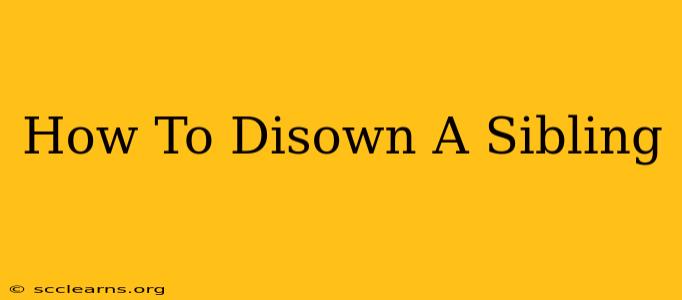Facing the incredibly difficult decision of disowning a sibling is rarely impulsive. It usually follows years of hurt, betrayal, or irreconcilable differences. This isn't a decision to be taken lightly, and there's no easy answer. This guide explores the process, focusing on both the emotional and legal aspects, helping you navigate this complex situation.
Understanding the Emotional Impact of Disowning a Sibling
Before delving into the practicalities, let's acknowledge the profound emotional toll disowning a sibling takes. This isn't just about severing a relationship; it's about grieving the loss of a family member, grappling with guilt, and potentially facing judgment from others.
Processing Your Feelings:
- Acknowledge your pain: Allow yourself to feel the full spectrum of emotions – anger, sadness, betrayal, relief, even guilt. Suppressing these feelings will only prolong the healing process. Consider journaling or talking to a therapist to process your emotions.
- Define your boundaries: Clearly identify the behaviors that led to this decision. Understanding why you're taking this step is crucial for moving forward.
- Accept the consequences: Disowning a sibling will impact family gatherings, holidays, and potentially other relationships within your family. Prepare for the ripple effect of this decision.
The Legal Aspects of Disowning a Sibling
Contrary to popular belief, there's no legal process to formally "disown" a sibling. Family law doesn't offer a mechanism for severing familial ties. However, you can control your interactions and limit their access to your life.
Controlling Contact:
- Block their contact: This includes phone numbers, emails, social media accounts, and any other means of communication.
- Legal limitations: If necessary, seek legal counsel to obtain restraining orders or protective measures if you're facing harassment or threats.
- Estate planning: Update your will and other estate planning documents to explicitly exclude the sibling from inheriting any assets. This is a crucial step to ensure your wishes are respected.
Alternatives to Complete Severance
Before making the final decision, consider alternative approaches. Sometimes, professional help can bridge the gap.
Family Therapy or Mediation:
- Professional guidance: A therapist or mediator can facilitate communication and help navigate difficult conversations. They can provide a neutral space for discussing grievances and finding potential solutions.
- Improved communication: This option focuses on repairing the relationship, even if it can't fully restore it.
Living With Your Decision
Once you've made the decision, it's crucial to focus on self-care and healing.
Supporting Yourself:
- Seek support: Lean on trusted friends, family members, or a therapist. Sharing your experience can help alleviate feelings of isolation.
- Focus on self-care: Prioritize your mental and emotional well-being. Engage in activities that bring you joy and promote relaxation.
- Acceptance and moving forward: Accepting the decision and focusing on your own well-being are key to finding peace.
Disowning a sibling is a momentous and painful decision. It’s crucial to understand the emotional and practical implications before taking this step. Remember, seeking professional guidance can be invaluable during this challenging time. While you can't legally disown someone, you can control your interactions and protect yourself. Prioritize your well-being and focus on building a healthier and happier life for yourself.

